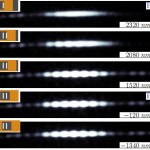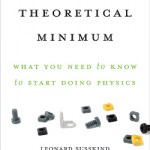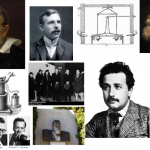Theory
Yesterday's big post on why I think people should embrace scientific thinking in a more conscious way than they do already (because my claim is that most people already use scientific thinking, they're just not aware that they're doing it) is clearly a kind of explanation of the reason behind my next book, but what about the previous two? How does teaching people about modern physics through imaginary conversations with my dog serve the general goal of getting people to think more scientifically?
The following is a bit of a retcon-- after all, the proximate cause of my writing those books was…
I had lunch with Ethan Zuckerman yesterday, and we were talking about technology and communicating science to a mass audience, and Michio Kaku came up. Specifically, the fact that he's prone to saying stuff that's just flat wrong, if not batshit crazy-- see this angry post from 2010 for an example.
It was amusing, then, to return to my RSS reader and find first Sean Carroll and then Matt Strassler expressing outrage and annoyance over some incredibly dumb things Kaku said about the Higgs Boson. My initial reaction was along the lines of "Yeah, welcome to the club," but I suspect that that's…
This is the physics book that's generating the most buzz just at the moment, by noted string theorist Leonard Susskind and George Hrabovsky, based on a general-audience course Susskind's been running for years. It's doing very well, with an Amazon rank in the 300's, which is kind of remarkable for a book with this many equations. Using calculus, even.
Odd though it might seem given the mathematical content, this is a book that has a lot in common with Cox and Forshaw's Why Does E=Mc2?. By which I mean that it sets out to present a very particular take on theoretical physics to a general…
I ran across this recently while looking for something else, and was reminded of it by this discussion of jargon. It's an attempt to explain the general historical context of the whole Higgs Boson thing, and why it's important. I improvised this in response to somebody's question about how I would explain that, drawing mostly on my recollection of a couple of history-of-field-theory books. I kept it in case I needed to bust it out when they discovered the Higgs, but that fell during the time when I wasn't able to blog, so I never used it. I'm never going to use it for anything else, though,…
There's been a bunch of talk recently about a poll on quantum interpretations that showed physicists badly divided between the various interpretations-- Copenhagen, Many-Worlds, etc.-- a result which isn't actually very surprising. Sean Carroll declares that the summary plot is "The Most Embarrassing Graph in Modern Physics, which I think is a bit of an overreaction, but not too much of one. I do strongly disagree with one thing he says in explaining this, though:
Not that we should be spending as much money trying to pinpoint a correct understanding of quantum mechanics as we do looking for…
We're at that time of year where people publish lists of top stories of the year, but as many crazy people will be happy to remind you, this Friday marks the end of another calendrical period, in the Mayan calendar. So, I'm going to steal an idea from a college classmate on Facebook, who wrote:
When I look back on Baktun 13, I'm going to remember all the wonderful things that happened. What's your best memory from the last 144,000 days?
This seems like a good way to get some more cheerful and science-y content on the front page of the blog. So, without further ado (or very much thought),…
It's been a while since I did any ResearchBlogging posts, because it turns out that having an infant and a toddler really cuts into your blogging time. Who knew? I keep meaning to get back to it, though, and there was a flurry of excitement the other day about a Nature Physics paper proposing a way to search for quantum gravity not with a billion-dollar accelerator, but with a tabletop experiment. There's a write-up at Ars Technica, but that comes at it mostly from the quantum gravity side, which leaves room for a little Q&A from the quantum optics side.
Wait a minute, you said this is in…
I finally got a copy of Cox and Forshaw's The Quantum Universe, and a little time to read it, in hopes that it would shed some light on the great electron state controversy. I haven't finished the book, but I got through the relevant chapter and, well, it doesn't, really. That is, the discussion in the book doesn't go into all that much more detail than the discussion on-line, and still requires a fair bit of work to extract a coherent scientific claim.
The argument basically boils down to the idea that the proper mathematical description of a universe containing more than one fermion is a…
The other controversial thing this week that I shouldn't get involved in is the debate over whether Brian Cox is talking nonsense in a recent discussion of the Pauli Exclusion Principle. Tom at Swans on Tea kicked this off with an inflammatory title, and Cox turned up in the comments to take umbrage at that. Sean Carroll provides a calmer and very thorough discussion, the comments to which include a number of well-known science popularizers duking it out.
My take on it is basically the same as Tom and Jim Kakalios in Sean's comments: unless the two particles you're talking about are within…
Regular reader Johan Larson sends in a good question about academic physics:
You have written about teaching various courses in modern physics, a subject that has a fearsome reputation among students for skull-busting difficulty. That suggests a broader question: what is the most difficult course at your university? Or even more broadly, how would one determine what course is the most difficult?
This is a good question, but hard to give a single answer to. The most difficult course at the college as a whole would be nearly impossible to determine, because different students find different…
Proving that you can find physics in everything, Sean Carroll points to a strange anomaly in the Super Bowl coin toss: the NFC has won 14 coin tosses in a row. The odds of this happening seem to be vanishingly small, making this a 3.8-sigma effect, almost enough to claim the detection of a new particle, and certainly enough to justify the generation of a press release.
Of course, there are two problems with Sean's analysis, one classical and one quantum. The classical objection is that what we have a record of is one team winning the toss every time, which does not mean that the coin is doing…
The toy model of statistical entropy that I talked about the other day is the sort of thing that, were I a good computational physicist, I would've banged out very quickly. I'm not a good computational physicist, but by cargo-culting my way through some of the VPython examples, I managed to get something that mostly works:
The graph at the bottom of that window is the entropy versus "time" for a lattice of 20 sites with a 25% hopping probability (either left or right). The window with the colored balls at the upper left is a graphical representation-- red dots are "occupied" sites, white "…
Newton's birthday (in the Julian calendar) is Sunday, so we're in the final days of the advent calendar. Which means it's time for the equations that are least like anything Newton did, such as today's:
This is the Schrödinger equation from non-relativistic quantum mechanics. If you want to determine the quantum state of an object that's moving relatively slowly, this is the equation you would use.
It also has probably the greatest origin story of any of the equations we've talked about. Or at least the most salacious origin story of any of the equations we've talked about...
Erwin…
Today's equation in our march to Newton's birthday is actually a tiny bit out of order, historically speaking:
This is the Rydberg formula for the wavelengths of the spectral lines in hydrogen (and hydrogen-like ions), with R a constant having the appropriate units, and the two n's being two dimensionless integers. This equation was developed in 1888 by the Swedish physicist Johannes Rydberg (who was generalizing from a formula for the visible lines of hydrogen that was worked out by a Swiss schoolteacher, Johann Balmer). As such, it pre-dates Einstein's equation from yesterday, but its…
Over at Backreaction, Bee is running an advent calendar of her own, with amusing anecdotes about famous physicists. Apparently, it's a good year for advent calendars.
A couple of days ago, her story was a famous one about Heisenberg nearly failing to get his Ph.D. because he disdained experiment:
Wien wanted to fail Heisenberg, but Sommerfeld, in whose exam on theoretical physics Heisenberg had excelled, put in a strong word for Heisenberg. Heisenberg passed the doctoral examination with the lowest possible grade
Between this, and my own advent calendar posts about historical physics, I got…
Over at Scientific American, John Horgan has a blog post titled In Physics, Telling Cranks from Experts Ain't Easy, which opens with an anecdote any scientist will recognize:
A couple of decades ago, I made the mistake of faxing an ironic response to what I thought was an ironic faxed letter. The writer--let's call him Tachyon Tad--had "discovered" a new physics, one that allowed for faster-than-light travel. In my reply, I told Tad that if he built a warp-drive spaceship, I'd love to hitch a ride. Dumb joke. For months, my fax machine churned out sheets covered with Tad's dense elaborations…
As the advent calendar moves into the E&M portion of the season, there are a number of possible ways to approach this. I could go with fairly specific formulae for various aspects, but that would take a while and might close out some other areas of physics. In the end, all of classical E&M comes down to four equations, known as Maxwell's equations (though other people came up with most of them), so we'll do it that way, starting with this one:
This is the first of Maxwell's equations, written in differential form, and this relates the electric field E to the density of charge in…
One of the things that is sometimes very frustrating (to me, at least) about popular physics books is that they rush very quickly through the physics that we already know, in order to spend time talking about wildly speculative ideas. This not only gives some of these books a very short shelf life, as their wilder speculations get ruled out, but it does a dis-service to science. Because as cool as some of the things that might be true are, the stuff that we already know is pretty awesome in its own right, and even more amazing for being true.
Happily, Frank Close's new book, The Infinity…
It's been a while since I posted anything science-y, and I've got some time between flipping pancakes, so here's an odd thing from the last few weeks of science news. Last week, there was an article in Nature about the wonders of string theory applied to condensed matter physics. This uses the "AdS/CFT" relationship, by which theorists can take a theory describing a bunch of strongly interacting particles in three dimensions (such as the electrons inside a solid), and describe it mathematically as a theory involving a black hole in four dimensions. This might seem like a strange thing to do,…
In a lot of ways, the OPERA fast-neutrino business has been less a story about science than a story about the perils of the new media landscape. We went through another stage of this a day or two ago, with all sorts of people Twittering, resharing, and repeating in other ways a story that the whole thing has been explained as a relativistic effect due to the motion of GPS satellites. So, relativity itself has overthrown an attack on relativity. Huzzah, Einstein! Right?
Well, maybe. I'm not quite ready to call the story closed, though, for several reasons. First and foremost is the fact that…


